Canadian politics: There’s a broad desire for change, but discomfort with alternatives, Abacus Data Poll
June 14, 2023
From June 6 to 11, 2023, Abacus Data conducted a national survey of 2,000 adults exploring several topics related to Canadian politics and current events as part of our regular national omnibus surveys. In this survey, we oversample Ontario to a total of 1,000.
In this survey, we asked a new question to gauge both the desire for change and the perception that there’s an alternative those wanting change are comfortable with.
I’m going to start there.
Overall, 81% of Canadians believe it is time for a change in government. 20% believe Justin Trudeau and the Liberals deserve to be re-elected. But among the 81% who want change, 31% say there isn’t a good alternative to the Liberals they are comfortable with.
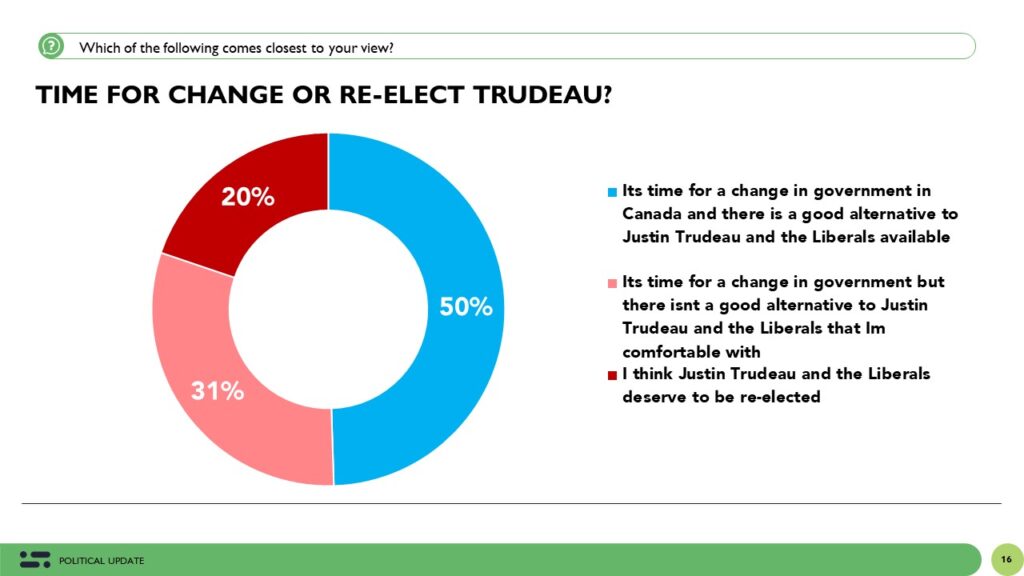
Those who want change but say they are not comfortable with any of the alternatives to the Liberals are:
- Slightly more likely to be women than men (55% to 45%)
- 45% voted Liberal in 2021. 21% voted NDP and 13% voted Conservative.
- 50% self-identify as being centrist, 36% are on the left side of the spectrum and 14% are on the right.
- 28% have a positive impression of Justin Trudeau while 41% have a negative one. 29% have a neutral impression of the Liberal leader
- 27% are currently undecided when asked how they would vote today, significantly higher than the other two groups (those who want change and think there’s an alternative and those who think the Liberals deserve to be re-elected)
More interesting is how these three groups say they would vote if an election was today.
Among those who want change and think there’s a good alternative, 56% would vote Conservative, 25% NDP and 6% would vote Liberal.
Among those who think the Liberals deserve to be re-elected, 77% would vote Liberal, 11% NDP, and 6% BQ. Only 2% would vote Conservative.
Among the 31% who want change but don’t think there’s a good alternative they are comfortable with, 33% would vote Liberal, 22% NDP, 19% Conservative, and 14% BQ.
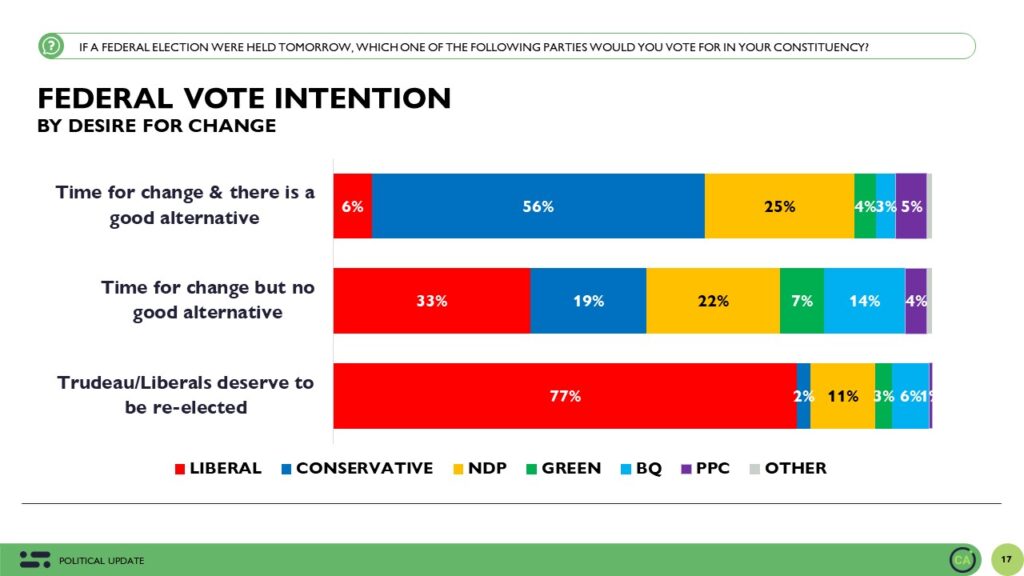
This group – those who want change but aren’t completely comfortable with the alternatives – will decide the next election. And right now, enough of them are staying with the Liberals giving them a shot at re-election. If any of the opposition parties can make themselves more appealing, that becomes a dangerous place for the Liberals.
Despite the desire for change, 46% of adults say they would consider voting Liberal, an accessible voter pool that hasn’t changed much over the past two and half years. This means while there is a desire for change, many haven’t completely closed the door to voting Liberal.
Current Vote Intention
If an election was held today, the Conservatives would get 35% (up 2 since mid-May), the Liberals at 28% (down 2), the NDP at 21% (up 3) with the BQ at 7% nationally. Numerically, this is the lowest we’ve had the Liberals over the past year.

Regionally, the Conservatives are ahead in the Prairies, are statistically tied with the NDP in BC, statistically tied with the Liberals in Ontario, and are at 30% in Atlantic Canada. The Liberals are statistically tied with the BQ in Quebec and ahead in Atlantic Canada.

By age, the NDP is numerically ahead among those under 30 but its support shrinks among older age groups. The Liberals get about 25 to 30% across all age groups while the Conservatives lead among those 45 and over.

Party Leader Impressions
Impressions of Justin Trudeau are largely unchanged from last month. 30% have a positive impression while 49% have a negative impression for an overall score of -19. Trudeau’s scores across the country are -22 in BC, -42 in Alberta, – 49 in SK and MB, -16 in Ontario, -6 in Quebec, and -4 in Atlantic Canada.
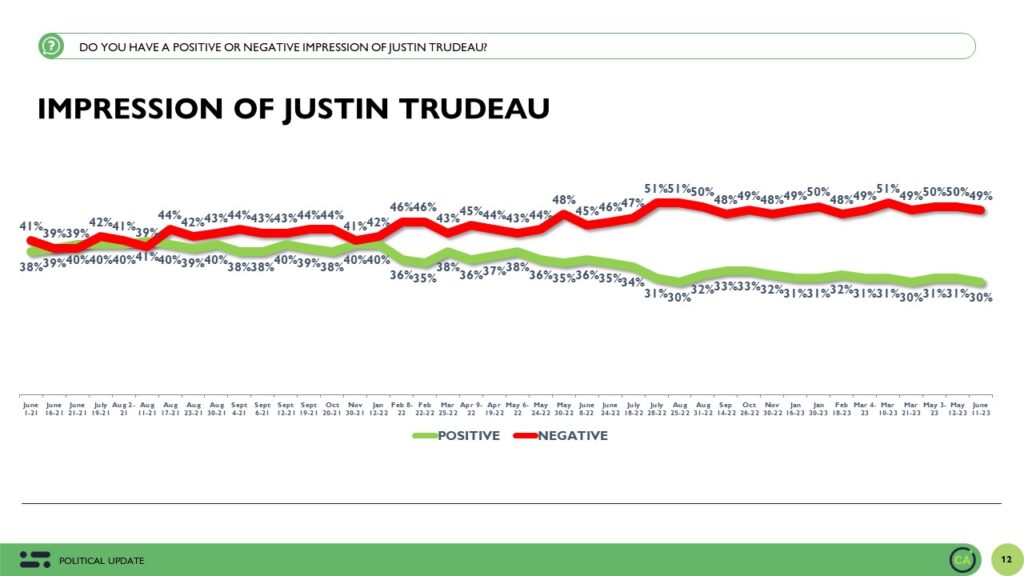
Both positive and negative impressions of Pierre Poilievre have increased over the past month. Today 32% have a positive impression while 40% have a negative impression for an overall score of -8. Over the past 6 weeks, Mr. Poilievre’s negatives have risen by 5 points from 35% in early May to 40% today. Poilievre’s scores across the country are -4 in BC, +15 in Alberta, +5 in SK and MB, -5 in Ontario, -31 in Quebec, and -10 in Atlantic Canada.
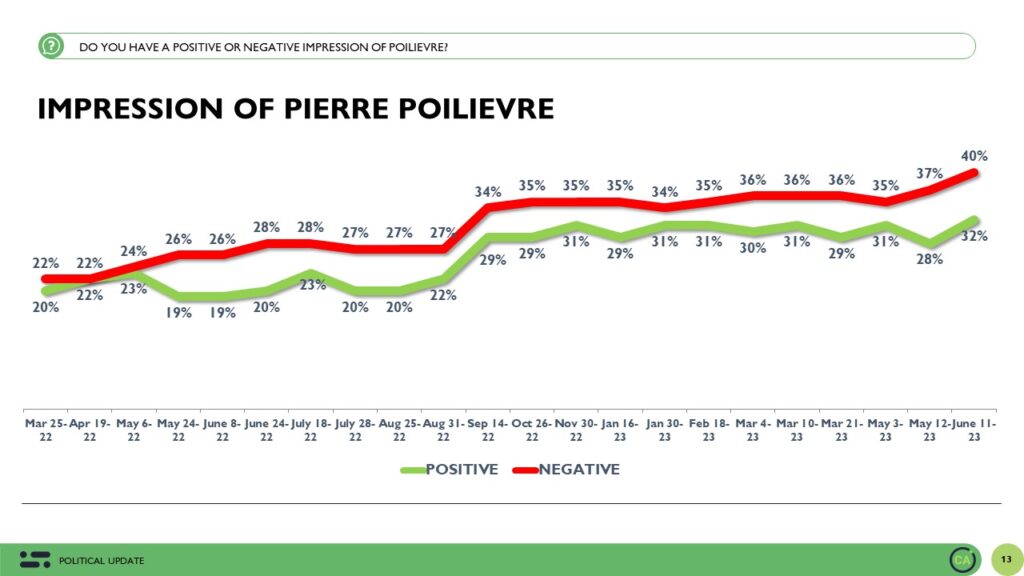
Jagmeet Singh remains the most popular leader in the country with 38% having a positive impression (up 4 in 6 weeks) and 32% having a negative view for a score of +6. Singh’s scores across the country are +16 in BC, -13 in Alberta, -7 in SK and MB, +7 in Ontario, +5 in Quebec, and +28 in Atlantic Canada.
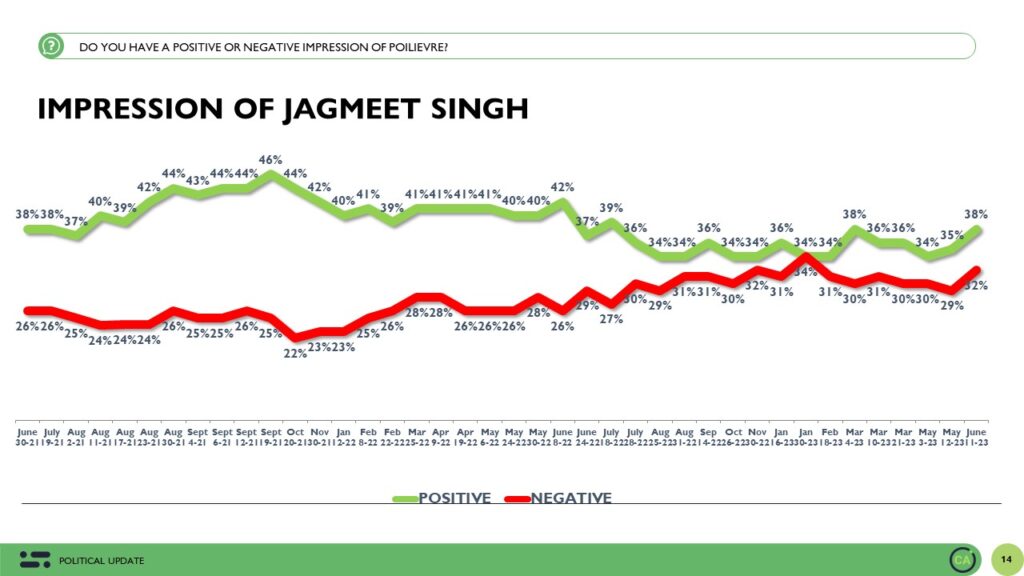
UPSHOT
According to David Coletto: “The opinion environment for the Liberal government is quite challenging. 80% of Canadians say they want change and only 20% think the government deserves to be re-elected.
Despite this, the Liberals are still competitive because about 1 in 3 Canadians who want change, don’t feel there’s an acceptable or comfortable alternative to the Liberals. Most of them are voting for an opposition party, if an election was held today, but not all of them. A third is sticking with the Liberals, despite wanting change.
This dynamic indicates a complex and nuanced political environment in Canada, reflecting a broad dissatisfaction with the current Liberal government, yet also a degree of apprehension about alternatives.
While it might seem like a grim outlook with 80% of the populace desiring change, the Liberals can find some solace in the fact that a notable fraction of those yearning for change still doesn’t see a viable alternative. This can be seen as a testament to the government’s relative stability or the perception of the Liberals as the lesser of multiple evils. However, this shouldn’t invite complacency, but rather it should serve as a wake-up call to address public discontent. The Liberals need to reexamine and realign their policies with public sentiment to re-establish trust and strengthen their electability.
For opposition parties, these results are both an opportunity and a challenge. The desire for change signifies widespread discontent, creating a political vacuum that they can fill. However, the inability of a substantial fraction of voters to identify a comfortable alternative underscores a failure on the opposition’s part to present a compelling, viable vision for leadership. To capitalize on this scenario, opposition parties need to effectively communicate their policies, presenting clear, tangible alternatives to the current government’s approach. The closer we get to an election, the more the acceptability of the opposition parties will be under scrutiny.
From a broader perspective, this situation illustrates a common dilemma in many democracies: the desire for change coupled with the fear of the unknown. While change is often seen as a positive, progressive force, it can also introduce uncertainty. When voters are unsure of the alternatives, they may opt for the status quo, even if they’re dissatisfied with it. This dynamic can stagnate political landscapes and force a more polarizing, negative type of politics.”
METHODOLOGY
The survey was conducted with 2,000 Canadian adults from June 6 to 11, 2023. A random sample of panelists were invited to complete the survey from a set of partner panels based on the Lucid exchange platform. These partners are typically double opt-in survey panels, blended to manage out potential skews in the data from a single source.
The margin of error for a comparable probability-based random sample of the same size is +/- 2.2%, 19 times out of 20.
The data were weighted according to census data to ensure that the sample matched Canada’s population according to age, gender, educational attainment, and region. Totals may not add up to 100 due to rounding.
This survey was paid for by Abacus Data Inc.
Abacus Data follows the CRIC Public Opinion Research Standards and Disclosure Requirements that can be found here: https://canadianresearchinsightscouncil.ca/standards/
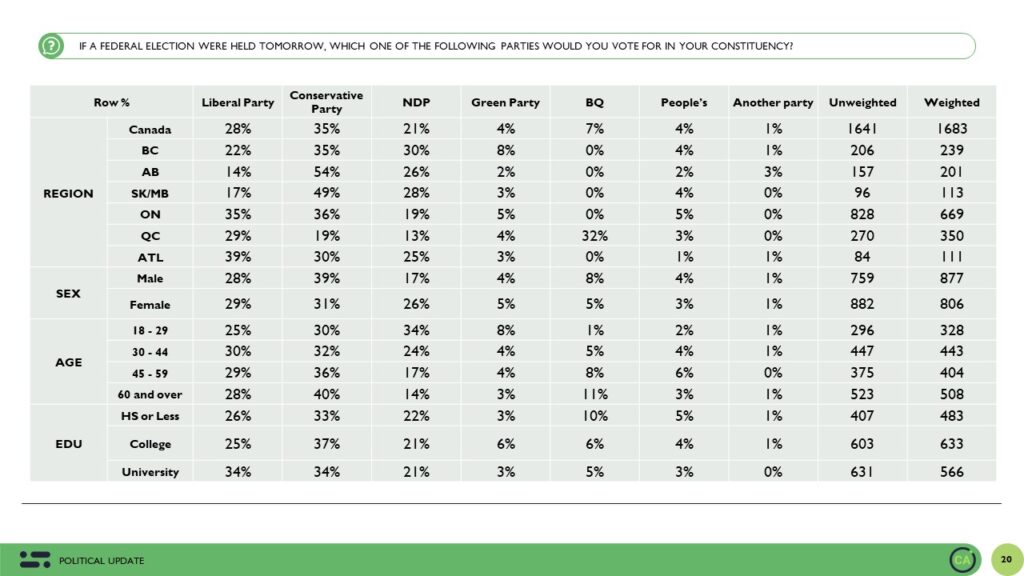
ABOUT ABACUS DATA
We are the only research and strategy firm that helps organizations respond to the disruptive risks and opportunities in a world where demographics and technology are changing more quickly than ever.
We are an innovative, fast-growing public opinion and marketing research consultancy. We use the latest technology, sound science, and deep experience to generate top-flight research-based advice to our clients. We offer global research capacity with a strong focus on customer service, attention to detail, and exceptional value.
We were one of the most accurate pollsters conducting research during the 2021 Canadian election following up on our outstanding record in 2019.
Contact us with any questions.
Find out more about how we can help your organization by downloading our corporate profile and service offering.



